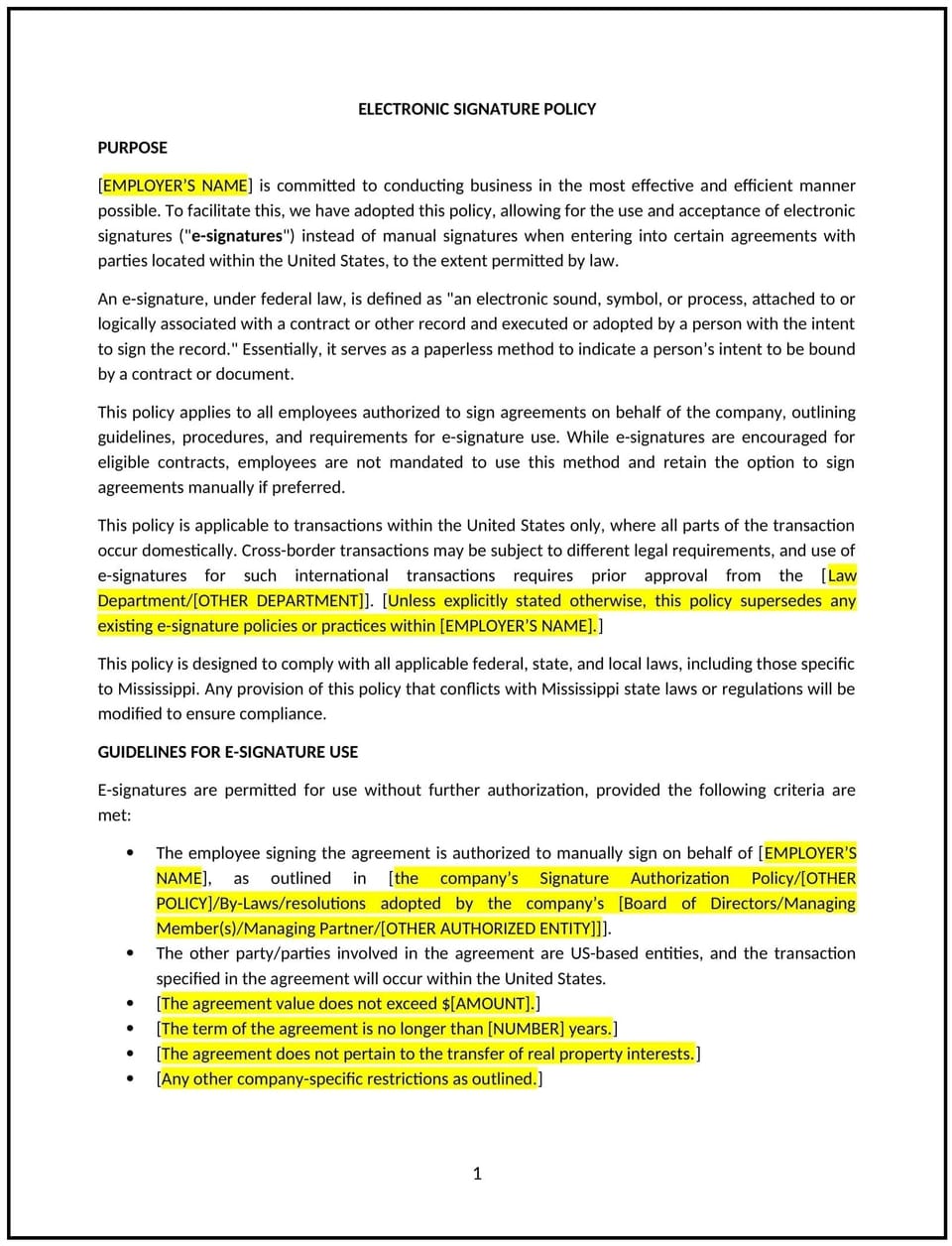Electronic signature policy (Mississippi): Free template

Electronic signature policy (Mississippi)
An electronic signature policy helps Mississippi businesses define and regulate the use of electronic signatures for contracts, agreements, and other official documents. The policy ensures that electronic signatures are used in a secure, legally binding manner, in accordance with both state and federal laws.
By implementing this policy, businesses can streamline their document signing process, reduce the need for paper-based records, and ensure the integrity of electronic transactions while maintaining legal validity.
How to use this electronic signature policy (Mississippi)
- Define what constitutes an electronic signature: Clearly outline what qualifies as an electronic signature under the policy. This can include digital signatures, typed names, and other forms of electronic consent.
- Identify the types of documents covered: Specify which types of documents or agreements can be signed electronically, such as contracts, employee agreements, non-disclosure agreements (NDAs), and other legal documents.
- Ensure security and authenticity: Detail how electronic signatures will be securely captured and stored. This may include using encrypted systems, third-party authentication, and audit trails to confirm the authenticity of signatures.
- Explain the legal status of electronic signatures: Highlight that, under Mississippi and federal law (such as the ESIGN Act and UETA), electronic signatures are legally valid and enforceable, provided they meet certain criteria.
- Address electronic signature tools and platforms: Define which platforms or tools the business will use to collect and manage electronic signatures, such as DocuSign, Adobe Sign, or other secure platforms.
- Set up authentication procedures: Specify the steps for authenticating the signer's identity, ensuring that only authorized individuals are able to sign documents electronically.
- Address exceptions and special cases: Clarify any situations where electronic signatures may not be accepted, such as for documents requiring notarization or certain government filings.
- Outline retention and storage of signed documents: Specify how signed documents will be stored and archived. This may include digital storage systems or other methods for securely retaining signed agreements for future reference.
Benefits of using this electronic signature policy (Mississippi)
This policy provides several benefits for Mississippi businesses:
- Increases efficiency: Electronic signatures reduce the time and effort involved in signing and managing documents, speeding up business transactions and improving operational efficiency.
- Reduces paper use: By relying on electronic signatures, businesses can reduce paper waste, lowering costs associated with printing, storing, and mailing physical documents.
- Improves security: Digital signatures can be encrypted, providing stronger security measures compared to traditional handwritten signatures, which are more susceptible to forgery.
- Enhances compliance: By following the legal guidelines for electronic signatures, businesses ensure they remain compliant with state and federal laws, avoiding potential legal challenges.
- Increases convenience: Employees, clients, and vendors can sign documents remotely, improving convenience and flexibility, especially in a distributed or remote work environment.
- Simplifies record-keeping: Digital records of signed documents are easier to organize, search, and retrieve, which improves document management and compliance tracking.
Tips for using this electronic signature policy (Mississippi)
- Communicate the policy effectively: Ensure all employees and stakeholders understand the electronic signature policy, including the procedures for using digital signatures and the legal implications.
- Provide training: Offer training on how to use electronic signature platforms, especially for employees involved in managing or processing signed documents.
- Use secure signature platforms: Only use trusted and secure platforms that comply with security standards and regulations to capture and manage electronic signatures.
- Implement strong authentication processes: Ensure that the platform you use includes measures to verify the identity of the signer to prevent unauthorized signatures.
- Regularly review the policy: As technology and regulations evolve, review and update the electronic signature policy to ensure it remains compliant and effective.
Q: Why should Mississippi businesses use electronic signatures?
A: Electronic signatures streamline the document signing process, reduce reliance on paper, and improve efficiency. They are legally valid and secure, ensuring businesses remain compliant and save time and resources.
Q: Are electronic signatures legally valid in Mississippi?
A: Yes, under both Mississippi state law and federal laws such as the ESIGN Act and UETA, electronic signatures are legally valid and enforceable when certain criteria are met.
Q: What types of documents can be signed electronically?
A: Many types of documents, including contracts, employee agreements, and NDAs, can be signed electronically. However, certain documents, such as those requiring notarization, may not be eligible for electronic signature.
Q: How does the business ensure the security of electronic signatures?
A: The policy should specify that the business will use secure, encrypted platforms to capture signatures and implement authentication procedures to verify the signer's identity.
Q: Can employees use their personal devices for signing documents?
A: The policy should specify whether personal devices can be used for electronic signatures, or if only company-approved devices and platforms are permitted to maintain security and compliance.
Q: How does the business store and manage signed documents?
A: Signed documents should be stored securely in digital systems that comply with data protection standards. The policy should outline the retention and archiving procedures to ensure proper record-keeping.
Q: Can employees request a copy of a signed document?
A: Yes, employees should be able to request copies of signed documents. The policy should specify how employees can access these records and the steps to obtain a copy.
Q: What happens if an electronic signature is contested?
A: The policy should outline procedures for handling disputes over electronic signatures, including how the authenticity of the signature will be verified and the steps to resolve the issue.
Q: How often should the electronic signature policy be reviewed?
A: The policy should be reviewed periodically, at least annually, to ensure it aligns with current business needs, legal requirements, and any updates in electronic signature technology.
This article contains general legal information and does not contain legal advice. Cobrief is not a law firm or a substitute for an attorney or law firm. The law is complex and changes often. For legal advice, please ask a lawyer.


